Until Colonization, the people of pre-colonial Nigeria had existed as individual tribes, led by traditional rulers. These rulers were often regarded as ‘demi-gods’ sent to guide the town, and they believed their commands to reflect the wishes of the gods. The traditional rulers held significant influence and control over their subjects. They also had a stronghold in their various locations bringing about peace and orderliness among the people.
In colonial Nigeria, under the indirect system of rule, the British adopted, these traditional rulers served as intermediaries between the colonial government and the people. These change dwindled the overall powers of pre-colonial traditional rulers.
Since the Nigerian of government became Federalism, the powers of these traditional rulers and kings have immensely reduced.
Despite this change, some of these kings have managed to retain power which qualifies them to be listed amongst the most powerful kings in Nigeria.
These powerful kings in Nigeria using their power still strongly influence things in the country, even its politics. They also command respect from a large number of the country’s population.
We would be considering some of the most powerful kings in Nigeria whose seats remain prominent in Nigeria. We have prepared these list considering traditional kingship thrones that have withstood the test of time and whose titles remain relevant in Nigeria today.
Most Powerful Kings in Nigeria
We have listed the most powerful kings in Nigeria for your reading pleasure:
1. Emir of Kano
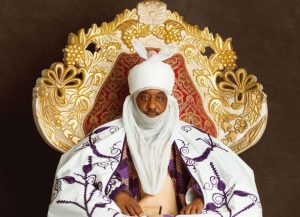
The Emir of Kano holds the position of the head of the Kano Emirate. Formed in 1805, the kano Emirate came into existence after Fulani Jihad when the old Hausa Sultanate of Kano became subject to the Sokoto Caliphate.
Following the death of Alhaji Dr Ado Abdullahi Bayero who became Emir in 1963 and ruled till his death on 6th June 2014 when a new Emir was appointed.
His Royal Highness Mallam Muhammad Sanusi II is the current Emir of Kano Malam Sanusi. Before his ascension to the throne, Mallam Muhammad Sanusi II was a successful banker and the former Governor of the Central Bank of Nigeria.
The Banker Magazine named Sanusi the World’s Best Central Bank Governor of the Year for 2011.TIME magazine also listed him on its list of most influential people of 2011.
This Emir of Kano title commands a lot of respect from Muslims all over the country; the position has a lot of power in it as the words of the holder become law when applied within its jurisdiction. This throne is often awarded to people considering; their background, popular support, connection, exposure, and financial muscle.
2. Alaafin of Oyo
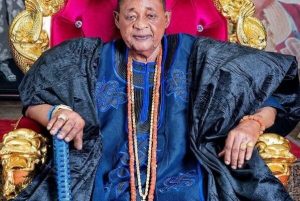
The position of the Alaafin of Oyo is one of the foremost powerful and influential monarchical titles held in Nigeria. The title Alaafin in the Yoruba Language means ‘king or ruler’.
The Alaafin title is the official title of the ceremonial ruler of all tribes in Oyo state, Nigeria. As a result of the 1900 political absorption into southern Nigeria of the kingdom, the position served as a tool in the British indirect rule, which the British used in colonising the Oyo empire region.
The Alaafin of Oyo possesses other names through which the people refer them to, like ‘kabiyesi,’ meaning the king who can question. He is also called ‘Iku baba yeye,’ meaning the king who can command death
The current Alaafin of Oyo is Lamidi Olayiwola Adeyemi III, who ascended the throne in 1970 after he succeeded Alaafin Gbadegesin Ladigbolu II.
3. Sultan of Sokoto
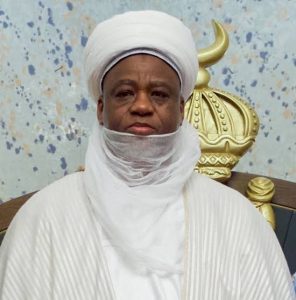
Dating back to the era of the British rule in Nigeria, the position of the Sultan has been held in high esteem. The caliph of Sokoto, locally known as ‘Sarkisian Musulmi,’ had absolute power among the rulers in central Sudan. He was in charge of the administration of Sokoto and exercised total control over the caliphate.
The Sultan is also the spiritual leader of Muslims in Nigeria, a position which also adds to his power. The current Sultan is Muhammadu Sa’ad Abubakar IV, born on 24th August 1956, who succeeded his late brother Muhammadu Maccido who lost his life in the ADC Airline flight 53 flight. Muhammadu Sa’ad Abubakar IV is the 20th Sultan of Sokoto. The succession to the Sultan of the throne is based on family ties and social standing
4. Ooni of Ife
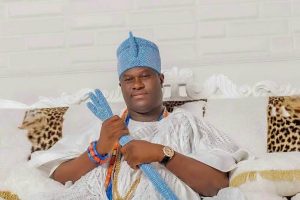
The Ọọ̀ni of Ilé-Ifẹ̀ is the traditional ruler of, Ile-Ife in Osun State popularly known as the home of Yorubas. Ile-Ife is an ancient city in southwest Nigeria, and its throne is currently held by the reigning Ọọ̀ni Adeyeye Enitan Ogunwusi Ojaja II.
Birthed on 17th October 1974, Ọọ̀ni Adeyeye Enitan Ogunwusi Ojaja II took over from the late Oba Okunade Sijuwade, who died on 28th July 2015. In October 2915 after the conclusion of traditional rites, Ọọ̀ni Adeyeye Enitan Ogunwusi Ojaja II ascended the throne.
The Ooni of Ife throne remains hugely influential in the world today and receives respect from Nigerians and foreigners home and abroad. Ascension to the throne is often based on family lines and the present Ooni may also choose his successor.
5. Dein Agbor
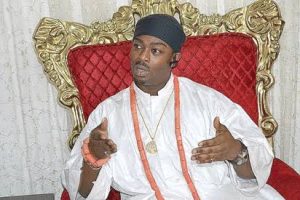
Agbor is an Iboh town in Delta once affiliated with the Benin empire before Benue got conquered by the British. The Dein Agbor throne was established by Omini who hailed from Agueri, a city in Delta state. The king is also known as ‘Eze’ or ‘Obi’.
Sitting on the Dein Agbor throne presently is Benjamin Ikechukwu Kaegborekuzi who ascended the throne at age two. This was as a result of the sudden death of his predecessor, his father.
Benjamin Ikechukwu Kaegborekuzi in 1981 entered the Guinness Book of Records as the world’s youngest monarch. He travelled abroad to complete his education, and a regent was appointed to take his place for the little time he was absent.
6. Oba of Benin
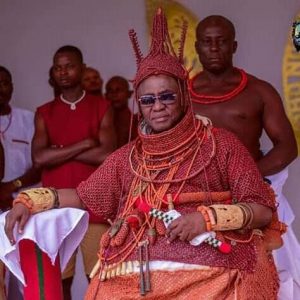
The ancient Benin Kingdom has withstood the test of time, surviving into present-day Nigeria and so also as its throne.
Oba of Benin is the ruler of the Edo people and also called the ‘Omo N’Oba’. He is the custodian of the Edo culture in the state. Oranmiyan, the Benin Empire’s first Oba, created the title of Oba when the title still had ‘Ogiso’ as its name. The Oba of Benin during the ancient time held the position of the Head of State of the Benin Empire.
In the past, the Oba of Benin was considered a god as the traditional ruler of the Edo people and head of the historic Eweka dynasty of the Benin Kingdom.
The present Oba of Benin is the Ewuare II, born on 20th October 1953. He became the Oba of Benin on 20th October 2016. He remains the 40th Oba given the title of Oba of Benin.
The Oba of Benin sometimes dives himself into political issues as he still possesses the power to make some decisions in that territory.
7. Oba of Lagos
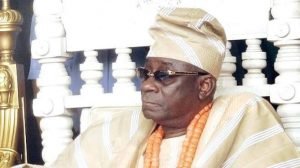
The Oba of Lagos holds the position of the traditional and sovereign figure in the city of Lagos, one of the largest cities in Africa. The Obas of Lagos all trace their lineage to Ashipa, a war captain of the Oba of Benin. He got rewarded and got the title of the Oloriogun, the war leader, and received a sanction to govern the city of Lagos.
Previous rulers of Lagos used the titles of Ologun, Eleko before it finally got changed to Oba of Lagos. The present Oba of Lagos is Oba Rilwan Akiolu, who succeeded his predecessor in May 2003.
The Oba of Lagos throne does not possess any political power, yet politicians still approach him for political advice. The king’s power covers all traditional activities in the land.
8. Obi of Onitsha
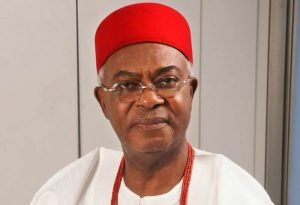
The Obi of Onitsha is associated with the conduct of essential aspects of Onitsha’s local affairs. The succession to the throne is only for the male descendants of the ‘founder of the state,’ Eze Chima. The people regard his descendants as ‘Umuezechima’ or children of Eze Chima.
The Obi is often called Igwe or sky and many more. Commonly referred to as semi-divine, he remains the embodiment of the spirit of the ancestral God. The Obi of Onitsha while being the traditional leader of Onitsha is also regarded as a representative of the Igbo people.
Currently sitting on the Obi of Onitsha throne is Igwe Nnayelugo Alfred Nnaemeka Achebe. His power sometimes covers a reasonable aspect of the whole Igbo ethnic but retains absolute control within the locality of Onitsha in Adamawa state
9. Olubadan of Ibadan
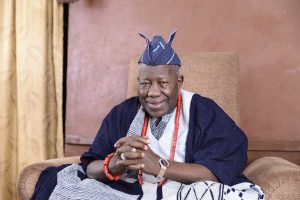
Olubadan of Ibadan is the royal title of the king of Ibadan land in Nigeria. The title means the lord of Ibadan. Two ruling families exist to the throne of the Olubadan, the Egbe Agba(civil), and Balogun (military). The kingmakers choose the new king from any of these families on a rotational basis to ascend the throne upon the death of the monarch.
The eleven chiefs that form the Olubadan-in-council are the traditional head of each of the eleven local governments in Ibadanland. They serve as presidents of the customary courts, charged with the responsibility of deciding on matrimonial cases, land cases, boundary, and communal disputes.
The present Olubadan is Oba Saliu Adetinji, who ascended the throne in 2016.
10. Olu of Warri
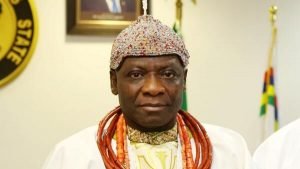
Our list of the most powerful kings in Nigeria would be incomplete without mentioning the Olu of Warri.
The Warri kingdom is a part of the traditional state in the town of Warri in Delta State, Nigeria. According to the Bini and the itsekiri, a prince of Benin founded the Iwerre(Warri) kingdom. The Olu of Warri remains the head of the itsekiri people. The kingdom of Warri has remained predominantly Christian since the ascension of the first Christian King Sebastian I ‘King Oba Atorongboye’ in 1570.
The present Olu of Warri is Godfrey Ikenwoli Emoki ‘Ikenwoli I’, who ascended the throne on the 12th December 2015. He was once an active member of the Warri traditional council since 1983 and also a member of Warri local government council, where he served at several places.
Final Word
Traditional rulers and kings still hold significant positions in Nigeria even as their powers have been reduced. These kings remain the heads of their various tribes. They are the voice of the people on matters affecting them.
Leave us a comment on your thoughts on the most powerful kings in Nigeria right now.
You should also read our piece on the wealthiest families in Nigeria right now.